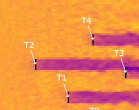Timing#
Hercules uses a simplified, UTC-first time model where all simulations are referenced to coordinated universal time (UTC).
Core Concepts#
Timing in Hercules is specified using two complementary representations:
time(float): Simulation time in seconds, wheretime=0corresponds tostarttime_utctime_utc(datetime): Absolute UTC timestamp
Input Requirements#
All Hercules input files must specify start and end times using UTC datetime strings:
starttime_utc: The UTC datetime when the simulation begins (required in input YAML)endtime_utc: The UTC datetime when the simulation ends (required in input YAML)
These are the ONLY time parameters you need to specify in your input file. Example:
dt: 1.0
starttime_utc: "2020-01-01T00:00:00Z" # ISO 8601 format
endtime_utc: "2020-01-01T01:00:00Z" # 1 hour simulation
Datetime String Format (ISO 8601)#
Hercules accepts UTC datetime strings in ISO 8601 format. The variable names starttime_utc and endtime_utc indicate that these times must represent UTC (Coordinated Universal Time).
Accepted formats:
Explicit UTC with “Z” suffix:
"2020-01-01T00:00:00Z"- The “Z” (Zulu time) explicitly marks the time as UTCNaive string (no timezone):
"2020-01-01T00:00:00"- Without timezone info, treated as UTC
Rejected formats:
Timezone offsets:
"2020-01-01T00:00:00+05:00"or"2020-01-01T00:00:00-08:00"- These imply a different timezone, which contradicts the UTC requirement
About ISO 8601: ISO 8601 is an international standard for representing dates and times. The format used by Hercules is:
Date:
YYYY-MM-DD(year-month-day)Separator:
T(separates date and time)Time:
HH:MM:SS(24-hour format)UTC marker:
Z(optional but recommended for clarity)
Examples:
"2020-01-01T00:00:00Z"- Midnight, January 1, 2020 UTC"2020-06-15T12:30:45Z"- 12:30:45 PM, June 15, 2020 UTC
When loading input files, Hercules validates that datetime strings don’t contain timezone offsets and will raise a clear error if a non-UTC timezone is detected.
Converting Local Time to UTC#
If you only know your local time and need to convert it to UTC (accounting for daylight saving time), Hercules provides a utility function to help:
from hercules.utilities import local_time_to_utc
# Midnight Jan 1, 2025 in Mountain Time (MST, UTC-7, no DST)
utc_time_jan = local_time_to_utc("2025-01-01T00:00:00", tz="America/Denver")
# Returns: "2025-01-01T07:00:00Z"
# Midnight July 1, 2025 in Mountain Time (MDT, UTC-6, DST in effect)
utc_time_july = local_time_to_utc("2025-07-01T00:00:00", tz="America/Denver")
# Returns: "2025-07-01T06:00:00Z"
Note: The tz parameter is required. You must specify your timezone using IANA timezone names.
Available Timezone Names:
Common timezone names:
US:
"America/New_York","America/Chicago","America/Denver","America/Los_Angeles"Europe:
"Europe/London","Europe/Paris","Europe/Berlin","Europe/Madrid"Asia:
"Asia/Tokyo","Asia/Shanghai","Asia/Dubai","Asia/Kolkata"Pacific:
"Pacific/Auckland","Pacific/Honolulu","Pacific/Sydney"
Complete list of timezones:
For a complete list of all available IANA timezone names, see:
Or in Python:
import zoneinfo
print(sorted(zoneinfo.available_timezones()))
The function automatically handles daylight saving time conversions based on the date you provide.
Example usage in your input YAML:
from hercules.utilities import local_time_to_utc
# If you want midnight local time (Mountain Time) on Jan 1, 2025
start_utc = local_time_to_utc("2025-01-01T00:00:00", tz="America/Denver")
end_utc = local_time_to_utc("2025-07-01T00:00:00", tz="America/Denver")
# Use these values in your YAML:
# starttime_utc: "2025-01-01T07:00:00Z"
# endtime_utc: "2025-07-01T06:00:00Z"
Computed Time Values#
When Hercules loads your input file, it automatically computes:
starttime: Always 0.0 (seconds)endtime: Simulation duration in seconds, computed as(endtime_utc - starttime_utc).total_seconds()
For the example above, endtime would be 3600.0 seconds.
Data File Requirements#
Wind and Solar Input Data#
Both wind and solar input CSV/Feather/Parquet files must contain a time_utc column with UTC timestamps:
time_utc,wd_mean,ws_000,ws_001,ws_002
2020-01-01T00:00:00Z,270.0,8.0,8.1,8.2
2020-01-01T00:00:01Z,270.5,8.1,8.2,8.3
...
The time column (numeric seconds from t=0) is computed internally by Hercules components and should NOT be included in your input files.
Time Coordinate System#
Timeline Visualization:
time (seconds): 0.0 ----------- duration (endtime) ----------->
| |
| |
time_utc: | |
v v
starttime_utc endtime_utc
(datetime) (datetime)
Key Points:
• time=0 corresponds to starttime_utc
• time is always relative to starttime_utc
• All times advance together: time_utc = starttime_utc + timedelta(seconds=time)
Output Files#
Hercules output HDF5 files store:
timearray: Simulation time points (seconds from t=0)steparray: Simulation step numbersstarttime_utcmetadata: Starting UTC timestamp (Unix timestamp format)time_utccolumn: Reconstructed UTC timestamps for each time point
The time_utc column in output data is reconstructed during read using:
time_utc = starttime_utc + timedelta(seconds=time)
Backward Compatibility#
Note for users with old output files: Hercules maintains backward compatibility with output files created before this timing model change. Old files may contain zero_time_utc metadata instead of starttime_utc. The output reader automatically handles both formats.
Consistency Validation#
When multiple plant components (wind, solar) provide time-series data:
All input data files must contain
time_utccolumnsThe
HybridPlantclass validates that all components’starttime_utcvalues matchA single
starttime_utcvalue is promoted to the top level ofh_dict
This ensures temporal consistency across all simulation components.
Best Practices#
Always use UTC timestamps in your input files to avoid timezone confusion
Use ISO 8601 format for datetime strings:
"YYYY-MM-DDTHH:MM:SSZ"Ensure data coverage: Your input data files must cover the full range from
starttime_utctoendtime_utcDon’t include
timecolumns in your input CSV files - Hercules computes these internallyMatch your dt: Ensure your input data’s temporal resolution is compatible with your simulation
dt
Example: Complete Timing Setup#
# hercules_input.yaml
name: example_simulation
dt: 1.0 # seconds
# Specify UTC times (REQUIRED)
starttime_utc: "2020-06-15T12:00:00Z"
endtime_utc: "2020-06-15T13:00:00Z" # 1 hour simulation
plant:
interconnect_limit: 50000 # kW
wind_farm:
component_type: WindFarm
wind_input_filename: inputs/wind_data.ftr
# wind_data.ftr must have time_utc column covering the simulation period
...
Your wind_data.ftr file should contain:
time_utc | wd_mean | ws_000 | ws_001 | ...
-------------------------|---------|--------|--------|----
2020-06-15T12:00:00Z | 270.0 | 8.0 | 8.1 | ...
2020-06-15T12:00:01Z | 270.1 | 8.0 | 8.1 | ...
...
2020-06-15T13:00:00Z | 271.5 | 8.2 | 8.3 | ...
Hercules will automatically compute the time column internally:
time_utc | time | ...
-------------------------|------|----
2020-06-15T12:00:00Z | 0.0 | ...
2020-06-15T12:00:01Z | 1.0 | ...
...
2020-06-15T13:00:00Z | 3600.0 | ...
